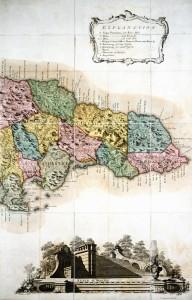26 Mar 2014
The Grenville collection consists of 131 slip cases and two loose bundles of maps and charts. The slip cases are in mock book form, covered in green leather, and inside the maps have been carefully dissected, mounted on linen and edged with coloured silk ribbon. The spines of the cases are numbered and named by geographic area, with occasional mention of individual cartographers as well. The collection covers the world with the main emphasis on Europe and for the most part consists of maps published in the latter half of the eighteenth century. It would appear that they were mostly assembled within the short space of time during which their collector: William Wyndham Grenville (1759-1834), was foreign minister between 1791 and 1801. They are an interesting reflection, therefore, on the cartographic material available to an English politician at the close of the eighteenth century. It represents his desire to bring himself abreast of current knowledge of the world and especially to gain a working knowledge of European affairs at the time. The collection is an interesting vehicle therefore by which a contemporary view of the world as it appeared to an English politician at the end of the eighteenth century can be gained. As Foreign Secretary Grenville needed to know aspects of military policy and there is a significant collection of maps relating to the war campaigns of eighteenth century Europe.
Grenville serving as Prime Minister saw that the 1807 Act to Abolish the Slave Trade was passed. He championed the law abolishing the trade and sincerely believe the Slave Trade to be “detestable.” His convictions are suitably demonstrated by his arguing: ‘What right do we derive from any human institution, or any divine ordinance, to tear the natives of Africa, to deprive them by force of the means of laboring for their own advantage, and to compel them to labour for our profit?...Can there be a question that the character of the country ought to be cleared from the stain impressed by the guilt of such traffic, by the effect of which we keep Africa in a state of barbarity and desolation?....Twice has this measure failed in this House, and if this iniquitous traffic is not now abolished, the guilt will rest with your lordships.’ Although Grenville’s maps and charts reside here at Greenwich, most of his manuscript letters are now located in the British Museum. Mike Bevan & Brian Thynne.